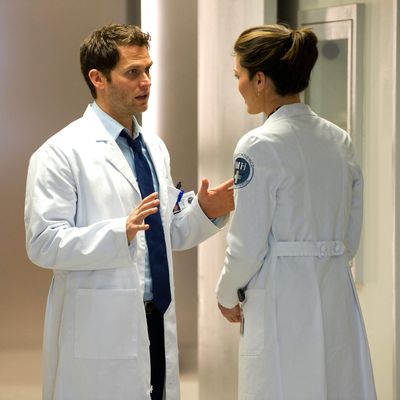
NBC’s Do No Harm (NBC, Thursdays, 10 p.m.) is a show that practically cries out to be on cable. It manages to be as nutty and sleazy as can be within network content limits, but it’s still not special enough to stand out. Steven Pasquale stars as Dr. Jason Cole, a hotshot Philadelphia surgeon who, unbeknownst to almost everyone, has a secret alter ego named Ian who’s very, very bad. I don’t want to get into too many details high up, in case you’re planning on watching tonight’s pilot; suffice it to say that Do No Harm is neither as trashy nor as clever as it needs to be to make a strong impression, and that Pasquale is the main (maybe only) reason to watch it, aside from a few blackly hilarious lines. Most of the latter are amusing because the star’s “Ian” incarnation is delivering them. Ian’s one of my favorite kinds of characters: one that, on some level, knows he’s in a drama and feels tremendously liberated by that fact.
Pasquale — a marvelous comic lead actor who was great on Rescue Me and in the underrated miniseries Coma — has a ball as Jason/Ian. You buy him both as an arrogant but basically decent surgeon and as a nightclub-crawling, sexed-up party monster with the capacity to deal drugs and commit murder. His Jack Nicholson grin is a hoot. If the show were up to his level, it’d really be something.
Created by David Schulner (Kings, The Playboy Club), Do No Harm is superficially similar to BBC’s Jekyll and is part of a larger tradition of stories about men trying to control an alter ego that’s lustful, violent, or just plain reckless. At various points, the pilot and the follow-up episode channel Dr. Jekyll and Mr. Hyde, The Incredible Hulk, Fight Club, and werewolf stories. These are all tales of impulse control, so it’s no surprise that they often play like very loose metaphors for the struggle to manage mental illness or addiction.
The latter comes through most strongly in the scenes of Jason at the hospital. Like Denzel Washington’s character in Robert Zemeckis’s Flight, this show’s hero constantly prompts colleagues and friends to wonder if he’s more trouble than he’s worth. Jason is one of those hotshot TV surgeons that’s constantly begging his boss (Phylicia Rashad, squandered, alas) to okay very risky or expensive procedures which of course turn out exactly as he’d hoped, then disappearing for hours or even days at a time, only to resurface looking like Nick Nolte’s mug shot. Jason does horrible things as Ian and doesn’t remember doing them, then apologizes to the people he’s wronged and promises never to do “that” again, whatever it was. “Why should I believe anything you say?” asks Dr. Lena Solis (Alana de La Garza), a colleague whom Jason is sweet on and whom Ian frightened and mistreated.
Jason belongs to a support group for people with personality disorders. His conversations with his sponsor, Will Hayes (John Carroll Lynch), are the show’s regular expository interlude; as Jason works through his crises with Will, we get a bit more insight into the “rules” governing his condition, but not quite enough to spoil future surprises or make additional episodes unnecessary. Do No Harm’s biggest fault, besides lackluster dialogue, is its overall air of deep insecurity, a quality that’s unfortunately too common on network dramas. Many of its scenes might be quite effective if the series would just calm down and focus on the actors, hold shots for more than a few seconds at a time, and give us enough dramatic breathing space (and soundtrack quiet) to consider what’s happening in the characters’ heads as they interact. Unfortunately the show is so terrified of boring us that it overcompensates by hyping every second with fast cuts and intrusively ominous synth music. These qualities amplify some of the silliness, and that’s pleasurable. But they also make Do No Harm feel like inconsequential trash rather than what I hope it is: exploitation that might become disreputable yet vital pop art if it learned to respect itself.





